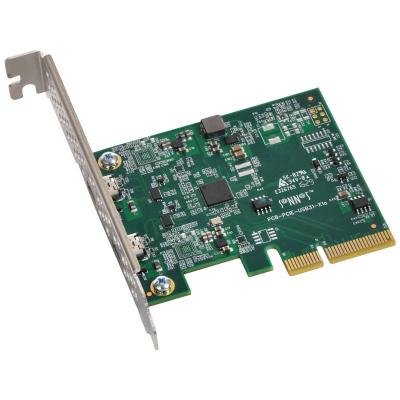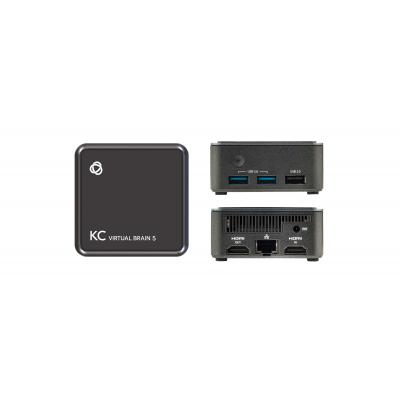Dual-Port SuperSpeed+ USB 3.1 Gen 2 Charging PCIe 3.0 Adapter Card
When it comes to supporting the fastest USB drives available, your computer’s USB 3.0 ports are perfectly adequate…for connecting peripherals that don’t depend on the ultimate USB 3.2 speeds. However, common USB 3.0 ports can be underachievers—at 5Gbps, they can’t support the maximum performance from many storage devices, and may not provide enough power to enable them to operate. You need SuperSpeed USB-C®.
The Allegro™ USB-C PCIe card supports data transfers at up to twice as fast as USB 3.0, and can also deliver 15W of power per port to USB-C bus-powered devices (three times the 4.5W specified in the USB 3.0 spec). Don’t settle for mediocre performance or insufficient power for the fastest SSDs—install an Allegro USB-C card to instantly add two Gen 2 USB 3.2 ports to your system and take full advantage of today’s SSD performance.
THE SONNET SPEED ADVANTAGE
Sonnet's Allegro USB-C PCIe card supports data transfers up to 960 MB/s when connected to a USB-C Gen 2 SSD RAID device—transfers complete in half the time compared with using a USB 3.0 2.5-inch SSD. And unlike other 2-port USB-C cards, the Allegro card provides 10Gbps bandwidth per port, enabling it to support simultaneous 925 MB/s data transfers from each of two separate SSDs! Other cards limit simultaneous transfers to 550 MB/s, a significant disadvantage when time is of the essence.
FULL POWER
Sonnet specially engineered the Allegro USB-C card to provide 15W of power through each of its ports. The ports communicate with the host that 3A of VBUS current is available, enabling this Sonnet solution to support USB-C bus-powered SSDs and SSD RAID devices that need 15W during demanding write operations.
REGULATES POWER TO EACH PORT
Ordinary USB-C adapter cards deal with power delivered through the ports as an afterthought, requiring an additional power source for the card and providing little regulation. The Allegro is no ordinary adapter card. The card regulates its own power without requiring a back-of-the card power cable connection, thus enabling full compatibility in any computer or Thunderbolt expansion system that doesn’t have these power connectors available.
Sonnet’s Allegro PCIe card is unique in regulating power to each port independently, giving each one protection from power glitches on the adjacent port. Without this protection (such as found on an ordinary card), connects and disconnects of one device may cause auto-disconnects of the other.
RESETTABLE FUSES
The Allegro features a resettable fuse on each port to protect the card and computer should there be a cable or peripheral failure. Should a fuse trip on the Sonnet card, you can reset it simply by shutting down the computer.
ADD USB 3.2 TO YOUR THUNDERBOLT MAC
Got a Mac with a Thunderbolt connection, but no PCIe slot? The Allegro is ideal for use in Sonnet’s Thunderbolt 2 and Thunderbolt 3 to PCIe card expansion systems, including Echo Express™ and xMac™ desktop and rackmount systems.
EASY INSTALLATION
This Allegro USBC-C PCIe installs easily into any PCIe x4 (mechanical) slot; both low-profile and full-height mounting brackets are included. The Sonnet card features hot-pluggable and hot-swappable device connection support with automatic device configuration, and works with all USB-IF compliant USB peripherals.
MAC COMPATIBILITY
• Mac Pro® 3,1, 4,1, 5,1, or 7,1 (2019 Mac Pro)
• macOS 10.12.6+
• macOS Catalina compatible
WINDOWS COMPATIBILITY
• Computer with PCIe slots
• Windows 10, 8.1, 7
• Windows Server 2016, 2012, 2008 (64-bit editions)
LINUX COMPATIBILITY
• Computer with PCIe slots
• Linux 5.1.9+ Kernel (LTS version only)
THUNDERBOLT COMPATIBILITY
• Supports USB 3.1 peripherals on a Mac or Windows PC when installed in a Thunderbolt 2 or Thunderbolt 3 PCIe expansion system
• macOS 10.12.6+(3)
• Windows 10 Build 1703 or newer (64-bit edition)
TECHNICAL NOTES
1. Product complies with USB 3.2 Gen 2 specification, which supersedes USB 3.1 Gen 2. Product package may still list USB 3.1 Gen 2.
2. Performance may be limited by PCIe 1.1 slot bandwidth.
3. macOS 10.12 erroneously reports a 5Gbps connection when connected at 10Gbps.
4. Must authorize charging support kernel extension in Security and Privacy System Preferences. (Unlock, then allow.)
5. Not compatible with Thunderbolt 1 PCIe Expansion systems.








